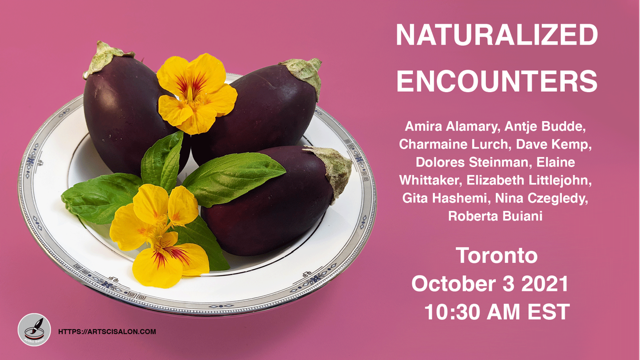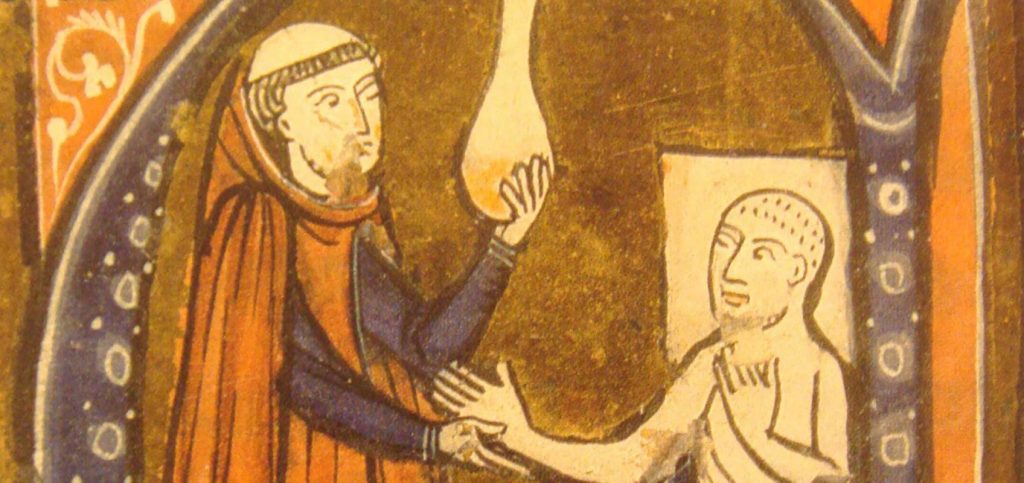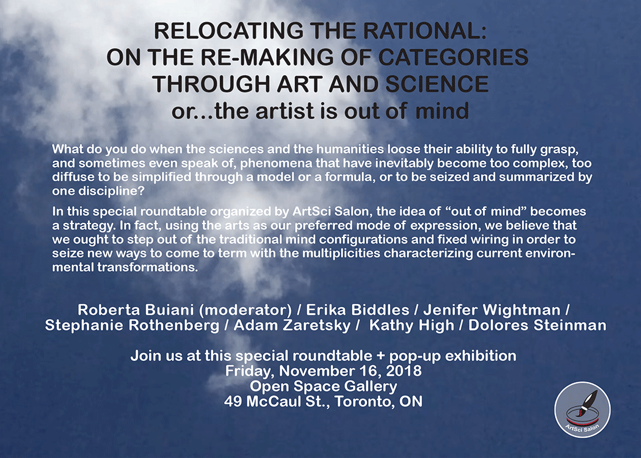
My September 26, 2021 Art/Sci Salon notice (received via email) provides these details,
Naturalization = The ecological phenomenon in which a species, taxon, or population of exotic (as opposed to native) origin integrates into a given ecosystem, becoming capable of reproducing and growing in it, and proceeds to disseminate spontaneously. In some instances, the presence of a species in a given ecosystem is so ancient that it cannot be presupposed whether it is native or introduced
How does adaptation through naturalization occur? What happens to the native population? How does coexistence happen?Our first event will revolve around the Solanum Melongena, a plant species in the nightshade family Solanaceae commonly known as the eggplant. This plant (and the many different names it goes by Aubergine, Melanzana, Brinjal, Berenjena, باذنجان, vânătă, 茄子,بادمجان) uncertain origins, grown worldwide for its edible fruit. Eggplants exist in many shapes, sizes and colors.
Our event will be a harvest potluck, with dialogues, storytelling, and exchanges about and beyond food. Our guests will engage in creative interventions to reflect on the many ways food, and food mobility affects all sentient beings, both humans and non-humans; peoples and civilizations; individuals’ health and collective traditions. Food is nourishment, care, medicine, and art. Food is political. Food is ultimately about our survival.
This is the first of a series of networked meals titled “FOLLOW THE SPREAD,” which will be staged around the world and across time zones throughout Fall 2021-Spring 2022 in Canada (October 3, Spring 2022), Norway (October 7), the Netherlands and Taiwan (Spring 2022).
Join us online to meet 10 Canadian artists and scholars as they launch the series in Toronto and engage in a nourishing and inspiring feast
…
Amira Alamary
TBAAntje Budde
Antje Budde is a conceptual, queer-feminist, interdisciplinary experimental scholar-artist and an Associate Professor of Theatre Studies, Cultural Communication and Modern Chinese Studies at the Centre for Drama, Theatre and Performance Studies, University of Toronto. Antje has created multi-disciplinary artistic works in Germany, China and Canada and works tri-lingually in German, English and Mandarin. She is the founder of a number of queerly feminist performing art projects including most recently the (DDL)2 or (Digital Dramaturgy Lab)Squared – a platform for experimental explorations of digital culture, creative labor, integration of arts and science, and technology in performance. She is interested in the intersections of natural sciences, the arts, engineering and computer science.Charmaine Lurch
Charmaine Lurch is a multidisciplinary artist whose painting, sculpture, and social engagement reveal the intricacies and complexities of the relationships between us and our environments. Her sculptures, installations, and interventions produce enchantment as she skillfully contends with what is visible and present in conjunction with what remains unsaid or unnoticed. Lurch applies her experience in community arts and education to create inviting entry points into overwhelmingly complex and urgent racial, ecological, and historical reckonings.Lurch’s work contends with both spatiality and temporality, enchanting her subject matter with multiple possibilities for engagement. This can be seen in the interplay between light, wire, and space in her intricate wire sculptures of bees and pollen grains, and in what scholar Tiffany Lethabo King refers to as the “open edgelessness” of Sycorax. A sensuous dynamism belies the everyday tasks reflected in her charcoal-on-parchment series Being, Belonging and Grace. Lurch’s particular evocations and explorations of space and time invite an analysis of their own, and her work has been engaged with by academics. These include King, who chose Sycorax Gesture, a charcoal illustration for the cover of her book The Black Shoals: Offshore Formations of Black and Native Studies, in which King discusses Lurch’s work in depth. Scholar Katherine McKittrick both inserted and engaged with Lurch’s work in her latest notable book, Dear Science & Other Stories.
Dave Kemp
Dave Kemp is a visual artist whose practice looks at the intersections and interactions between art, science and technology: particularly at how these fields shape our perception and understanding of the world. His artworks have been exhibited widely at venues such as at the McIntosh Gallery, The Agnes Etherington Art Centre, Art Gallery of Mississauga, The Ontario Science Centre, York Quay Gallery, Interaccess, Modern Fuel Artist-Run Centre, and as part of the Switch video festival in Nenagh, Ireland. His works are also included in the permanent collections of the Agnes Etherington Art Centre and the Canada Council Art Bank.Dolores Steinman
Dolores Steinman is a trained pediatrician who holds a Ph.D. from the University of Toronto. She is very active in several Art/Science communities locally and internationally.Elaine Whittaker
Elaine Whittaker is a Canadian visual artist working at the intersection of art, science, medicine, and ecology. She considers biology as contemporary art practice and as the basis for her installations, sculptures, paintings, drawings, and digital images. Whittaker has exhibited in art and science galleries and museums in Canada, France, Italy, UK, Ireland, Latvia, China, South Korea, Australia, Mexico, and the U.S. Artwork created as Artist-in-Residence with the Pelling Laboratory for Augmented Biology (University of Ottawa) was exhibited in La Fabrique du Vivant at the Pompidou Centre, Paris in 2019. She was one of the first Artists-in-Residence with the Ontario Science Centre in partnership with the Museum of Contemporary Art Toronto. Her work has also been featured in art, literary, and medical magazines, and books, including Bio Art: Altered Realities by William Myers (2015).Elizabeth Littlejohn
Elizabeth Littlejohn is a communications professor, human rights activist, photojournalist, and documentary film-maker. She has written for Rabble.ca for the past thirteen years on social movements, sustainable urban planning, and climate change. As a running gun social movement videographer, she has filmed internationally. Her articles, photojournalism, and videos have documented Occupy, Idle No More, and climate change movements, and her photographs have been printed in NOW Magazine, the Toronto Star, and Our Times.Recently Elizabeth Littlejohn has completed ‘The City Island’, a feature-length documentary she directed about the razing of homes on the Toronto Islands and the islanders’ stewardship of the park system, with the support of the Canada Council. Currently, Elizabeth is developing the Toronto Island Puzzle Tour, an augmented-reality smartphone application with five locales depicting hidden history of the Toronto Island, and funded by the City of Toronto’s Artworx Grant.
Gita Hashemi
Gita Hashemi works in visual and performance art, digital and net art, and language-based art including live embodied writing, and in publishing. Her transdisciplinary, multi-platform and often site-responsive projects explore historical, trans-border and marginalized narratives and their traces in contemporary contexts. She has received numerous project grants from Canadian arts councils, and won awards from Toronto Community Foundation, Baddeck International New Media Festival, American Ad Federation, and Ontario Association of Art Galleries among others. Hashemi is an Ontario Heritage Trust’s Doris McCarthy Artist in Residence in 2021 with a land-based project. Her work has been exhibited at many international venues including SIGGRAPH, Los Angeles; Center for Book Arts, New York; Yerba Buena Center for the Arts, San Francisco; Plug-In, Basel; Casoria Museum of Contemporary Art, Naples; Al Kahf Art Gallery, Bethlehem; Red House Centre for Culture, Sofia; Museo de Arte Contemporaneo de Yucatan, Merida; National Museum of Contemporary Art, Bucharest; Worth Ryder Gallery, Berkeley; Museo de Arte Contemporaneo de Santa Fe, Argentina; Museum of Movements, Malmo; and JolibaZWO, Berlin among others. In Canada her work has been presented at A Space Gallery, York Quay Gallery, YYZ, MAI, and Carlton University Art Gallery. She has exhibited in numerous festivals including Electroshock, France; VI Salon y coloquio internacional de art digital, Havana; New Media Art Festival, Bangkok; Biennale of Electronic Art, Perth; and New Music and Art Festival, Bowling Green and others.Nina Czegledy
Toronto based artist, curator, educator, works internationally on collaborative art, science & technology projects. The changing perception of the human body and its environment, as well as paradigm shifts in the arts, inform her projects. She has exhibited and published widely, won awards for her artwork and has initiated, led and participated in workshops, forums and festivals worldwide at international events.Roberta Buiani
Artistic Director of the ArtSci Salon at the Fields Institute for Research in Mathematical Sciences (Toronto). Her artistic work has travelled to art festivals (Transmediale; Hemispheric Institute Encuentro; Brazil), community centers and galleries (the Free Gallery Toronto; Immigrant Movement International, Queens, Museum of Toronto), and scientific institutions (RPI; the Fields Institute). She is a research associate at the Centre for Feminist Research and a Scholar in Residence at Sensorium: Centre for Digital Arts and Technology, at York University.Tune in on Oct 3 [2021] at 10:30 AM EDT; 4:30 PM CET; 10:30 PM CST [Note: For those of us on the West Coast, that will 7:30 am PDT]
To view the video on Sunday, Oct. 3, 2021, just go to the ‘Naturalized Encounters’ webpage on the ArtSci Salon website and scroll down.


